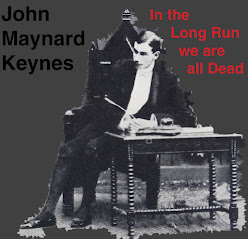The Classical Economists, Adam Smith (1723-1790), Thomas Robert Malthus (1766-1834), David Ricardo (1772-1823) and Karl Marx (1818-1883), collectively wrote in the 18th and 19th Centuries. All their works are currently in the public domain and available on line (see below). Neoclassical Economics supposedly made their works obsolete and you hear little about the Classics if you take a course in ECON 101. Still, there is a sinking feeling in the Economics profession that We Need Better Economic Models. What might the Classics have to offer? Briefly:- The Steady State Economy Modern economics assumes that growth can continue forever without limit. The Classics, on the other hand assumed that eventually growth would reach a steady state. For Marx, this was the Communist Society, which he described only general terms. There is evidence that current economies (here) are reaching a steady state and that it will not be the utopia envisioned by Marx.
- Economic Depressions and Business Cycles In Modern economics, cycles and long-waves are not supposed to happen. The market is supposed to adjust any imbalances in supply and demand and regulate the economy. The Classics assumed that booms, busts, panics, bubbles and manias could all happen and required explanation. For example, Malthus and Ricardo were concerned about effective demand, prefigured Keynes and did not assume markets handled all economic problems automatically.
- Historical Determinism Modern economics has no role for History. Models are timeless and general, much as universal physical forces. The Classics, particularly Malthus and Marx, understood that different models were required for different periods. Premodern societies are best described by the Malthusian Stagnation Model rather than the Neoclassical Growth Model. Marx thought that the Asiatic Model of Production was different from the Capitalist Model.
- Alternative Economic Models can be developed based on the Classics (see below). The models can and should be tested. Right now, the Neoclassical Economic Model is dominant and it is incomplete.
Modern Economics based on overdetermined, stable equation systems doesn't have a role for cycles, depressions, pre-modern models of production and History. Systems Theory, on the other hand, can easily handle cycles, instability, growth and steady states. Not that every problem is solved by recovering the past. Both the Classics and the Moderns jumped too quickly from their (mental) models to policy recommendations. Real SocioEconomic systems are far too complicated to be controlled by simple feed forward systems. The best we can do is analyze natural experiments as they are conducted in History and see if our systems models can capture what happened.
The bigger problem here is that Economics has been co-opted by Neoliberalism and Market Fundamentalism. What you get in ECON 101 is an attempt to describe the Economic System and an attempt to proscribe policy measures to tell politicians how to run the Economy. These attempts are largely a failure and have little historical justification or empirical support--at least the little that is offered in ECON 101. And, this is what the average student gets, if anything, as an introduction to Economics.
The Classical writers had very few mathematical, statistical or historical tools at their command for understanding the Economic System. They struggled with definitional issues and wrote in a verbose style we no longer find very straightforward. If we trained students to be Classical economists, we would just end up generating an avalanche of speculative, qualitative writing that never gets tested. In other words, we wouldn't get Science.
My recommendation is that we use the new tools available to us, primarily Systems Theory, to move on from both the Classical Economists and current Neoclassical Economics. Critics will argue that this has already been tried an failed, in Sociology by Talcott Parsons (1902-1979) and in Economics by Kenneth Boulding (1910-1993). The critics are wrong but having an argument won't solve anything.
Let me just make these assertions: Economics went wrong by insisting that everything has to be derived from individual, rational behavior, i.e., Homo Economicus. Systems theory argues that the the Economy is not just an aggregation of individual, rational behaviors. The system has both aggregate growth and aggregate feedback processes. We understand the variables involved in Growth (the Neoclassical Growth Model) but we have little understanding of the macro-feedback process and how the Economic System is controlled beyond the Aggregate Demand and Supply model (AD-AS model) which is incomplete. Just consider the simple Impact Model with markets for aggregate production (Q), energy (PE), and CO2 (PC, price of carbon--a market which is very incomplete).

In summary, we should continue to be interested in the Classics because they asked the right questions. We have to get beyond the Classics because the tools available to them (arm-chair speculation) did not produce the best answers. Western Civilization has not collapsed (yet). All the -isms (Liberalism, Communism, Fascism, Socialism, etc.) are flawed. And, we have new questions based on Systems Theory: Is the Economy Stable? Is the Economic System Under Control? What feedback loops are activated by crises? So many questions.
Classic References
These works are available on line:
Excellent Secondary Works
These secondary sources are worth tracking down and reading:










